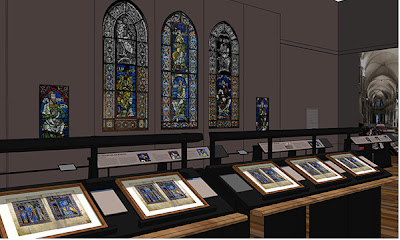At the exhibition of the St Albans
Psalter and Canterbury stained glass, hosted by the Getty Museum from September 20, 2013 to February
2, 2014 (http://www.getty.edu/art/exhibitions/canterbury/), the curators claim that ‘By uniting the intimate art of book illumination
with monumental glass painting, this exhibition explores how specific texts,
prayers and environments shaped the medieval viewer’s understanding of these
pictures during the period of artistic renewal following the Norman Conquest of
England’ (blurb on board at entrance wall). Pace
the facts that 'prayers' are 'texts', that it was more than England that the Normans conquered, and
there was never a diminution of English artistic achievement such that ‘renewal’
was required, the focus on ‘these pictures’ should have been a warning of what
was coming as I turned the end of the wall to face the first room. First,
though, I had to pass another board that mistakenly claimed: ‘[In 1066] Latin
replaced English as the written language used in government and religious
life’. First, Latin had always been used in government and religious life;
secondly, it did not replace English,
especially in ‘religious life’; thirdly, why do the curators feel it necessary
to ameliorate their exhibit by diminishing social and cultural accuracy? Why not
reflect a more nuanced historical reality?
 |
| Front Steps of The Getty |
What is really missing at the
exhibition, though, is that which claims to be present: the St Albans Psalter itself
(or, indeed, complete stained glass). In a provocative display, the curators
choose to maximize the literal spread of the codex by utilizing its current disbound
state to disperse bifolia through the four large, high-ceiled rooms, dimly lit
and ideologically impelled. Most curious is the decision to show bifolia in
separate wooden frames, categorized in sections by various labels like ‘Text
Page’ (containing the Alexis Quire, as if only those
folios have ‘text’). These exhibited bifolia are obviously conjugate pairs of leaves,
but since many are outer bifolia, this means that only very rarely does one
observe what would be an actual opening in the properly assembled and bound
book. Successive folios representing what a medieval viewer might have seen are
infrequent and the book is thus turned into a dismembered spectacle,
displayed in component parts (like the Calendar, which is shown out of
monthly order). The book is made extensive, but its functional extensity
is utterly elided.
This is understandable in some
respects, since spread-out like this, many folios are available for viewing by
many viewers simultaneously. A touchscreen reproduction of one opening, which is itself encased adjacently, allows the
reader to move around the virtual page with a cursor, with a neat function to allow
simultaneous translation of the Latin. A facsimile of the St Albans Psalter sits
on a lectern against a sidewall for the assiduous attendee, but there is
otherwise little left of the bookness of the book. Moreover, unhelpful
juxtapositions mislead or make convenient connections that cannot be
chronologically, generically or thematically justified. Thus, for instance, for
no apparent reason, two leaves of the Eadwine Psalter’s prefatory cycle (owned
now by the Pierpont Morgan, though more properly belonging with the unmentioned
Cambridge, Trinity College R. 17. 1) appear at the exhibit’s margins,
marginalized, against separate walls with little connection made between these
and St Albans’ deconstructed quires.
The first three of the large rooms
are deliberately made to emulate sacred space; the stained glass (with two
black-and-white supply panels) overlooks the fragmented Psalter, but does not connect with it in any meaningful way.
Situated in front of the glass are long benches, like church pews, and this
ecclesiastical setting is continued in oversized pictures (a cloister photograph
covers the end wall in the second room, for example; and Canterbury Cathedral’s
East End sits to the right of the stained glass).
 |
| Digital Image from http://blogs.getty.edu/iris/getty-voices-designing-canterbury-and-st-albans/ |
Why did this seem like a good
idea? Why is this hyperreal immersion, this pretend churchi-ness,
appropriate? The third room—loosely about saints and Thomas Becket—proffers
more forced connections: manuscripts with tentative links to Becket or showing
the same artist as one of those in the St Albans Psalter are juxtaposed with a
pilgrim badge, a Limoges reliquary, another reliquary casket and a liturgical
comb carved with Henry II and Becket. Perhaps I didn’t read carefully enough in
this room, but the theme of saints’ cults is oddly attached to two sets of
texts (the Psalter and the windows) that are concerned with saints in far more
complex ways than are suggested here. A more obvious connection might have been
salvation.
The final room is explicatory and by
far the clearest part of the exhibit. Cases demonstrate how medieval
illumination was produced and how stained glass is made. It’s a good final
reminder that in this exhibition we are dealing with real objects that have
multiple functions. The Psalter and the stained glass are not just pictures. There is so little emphasis on
word-text in the case of the Psalter that one would be forgiven for forgetting
the Book of Psalms is all about the text (said, sung, read, memorized). The
real object is displayed at The Getty, ironically, as if it were digital—chopped up into its
consistent parts, browsable in no defined order. And while it is a wonderful
opportunity to see up close the details of the manuscript’s folios, one wonders
what impression modern viewers are left with of this rather lovely, but here
entirely decontextualised, set of materials.








